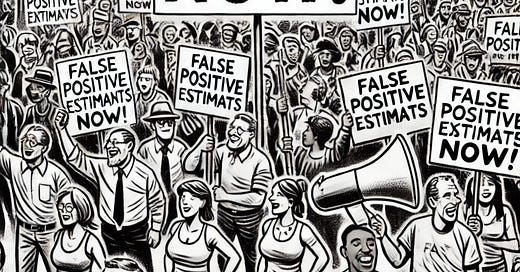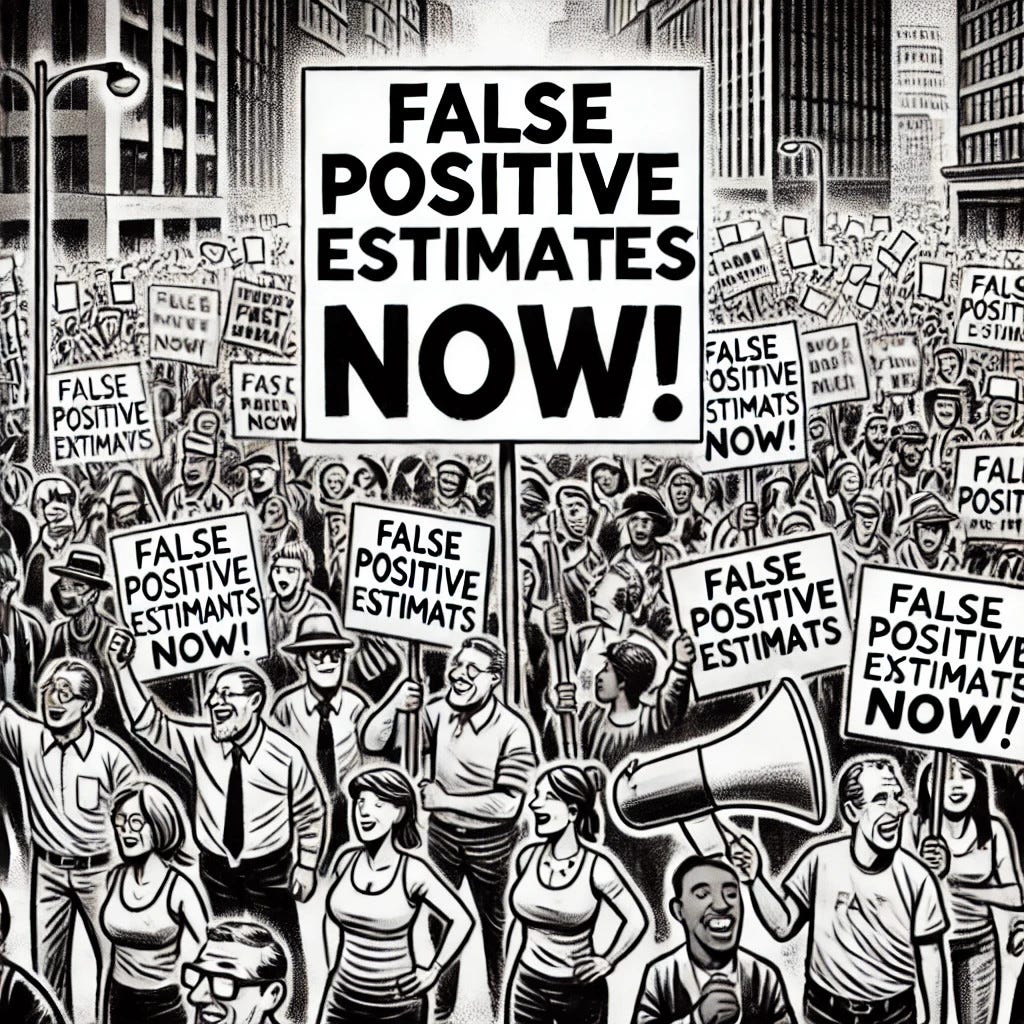Open Letter to the FDA: The Urgent Need for Mandatory Negative Controls in MPOX and H5N1 PCR Test Kits
COMMENT TO SIGN THE PETITION AND SHARE. THE IMPORTANCE OF THIS MESSAGE CANNOT BE OVERSTATED. SHARE, SHARE, SHARE!
8/15/2024
Dear Dr. Robert M. Califf, Commissioner of the U.S. Food and Drug Administration (FDA),
We, the undersigned and informed, are writing to express our grave concerns regarding the current standards for PCR test kits authorized under Emergency Use Authorizations (EUAs) for MPOX (Monkeypox virus) and H5N1 influenza virus.
First, however, we decry the World Health Organization’s decision to follow Tedros as he ignores WHO leadership and declares an MPOX emergency where none is proven to exist. The scientific community has not been able to secure assurances that the case numbers being reported in Africa are in any way accurate.
Similarly, we condemn your decision to declare H5N1 bird influenza an emergency.
On the matter of knowing whether there exist sufficient cases to warrant concern, within the US specifically, we demand that the FDA mandate the inclusion of negative controls in every individual PCR test run for these pathogens to ensure accuracy and reliability. This requirement is critical to prevent the widespread overestimation of case numbers, which, as we all learned from the COVID19 debacle, led to disastrous public health consequences due to unwarranted control measures. While the FDA has correctly informed only one MPOX virus test provider (the US CDC) of the necessity for negative controls in their EUA, the failure to extend this requirement to other test providers is a significant oversight that must be rectified immediately.
The absence of mandated negative controls and published estimates of the rate of false positives among the test-positive instances in the majority of FDA-authorized PCR test kits raises severe concerns about the accuracy and reliability of these tests. PCR technology, while powerful, is highly sensitive and prone to amplifying non-specific sequences significantly when cycle thresholds (CT values) exceed 35. Without negative controls and essential safeguards against false positives, there is a substantial risk of detecting non-specific targets (such as human genome or transcriptome sequences). This will lead to a gross overestimation of the prevalence of MPOX and H5N1, fueling unnecessary public fear, misdirecting public health resources, and ultimately eroding trust in public health authorities.
The implications of such overestimations are far-reaching. False positives not only distort the actual prevalence of the virus but also have the potential to misinform public health decisions, resulting in inappropriate measures such as unnecessary quarantines, lockdowns, and the misallocation of medical resources. These outcomes will actually serve to exacerbate the public health challenges the FDA seeks to mitigate, leading to more significant harm than benefit. The FDA's role in safeguarding public health demands that it enforce the highest standards in diagnostic testing, including the mandatory use of negative controls in all PCR test kits for MPOX and H5N1.
The risk of overestimating case numbers due to the lack of negative controls in PCR testing is not just theoretical; it has been observed in other contexts where high cycle thresholds were used without proper validation. For example, during the COVID-19 pandemic, the misuse of RT-PCR with excessively high CT values led to numerous false positives, which in turn resulted in inflated infection rates, misdiagnosed cases, and widespread public confusion. The same danger looms with MPOX and H5N1, where inaccurate case counts will lead to a significant misallocation of resources—such as vaccines, treatments, and public health interventions—away from where they are most needed. Individuals with other kinds of respiratory infections will die, for example, from bacterial pneumonia due to inappropriate diagnosis, as we saw in the COVID-19 public health debacle.
Moreover, false positives can trigger unnecessary public health actions, such as unwarranted self- or mass-quarantines, culling of wildlife falsely believed to be virus reservoirs, and further culling of livestock, leading to disruption of the food industry, shortages, higher prices, and inflation. These actions cause needless disruption and harm and erode public trust in health authorities and the scientific process. The FDA's responsibility is to ensure that testing protocols are robust and reliable, minimizing the risk of such outcomes. The FDA seems to foster a significant vulnerability to persist in failing at public health measures by failing to require negative controls in all PCR test kits.
The FDA's current stance, where only the CDC's PCR test kit was informed of the requirement for negative controls, is woefully insufficient. This selective enforcement undermines the overall credibility of the EUA process and puts the public at risk of the consequences associated with inaccurate diagnostics. The FDA must take immediate action to mandate the inclusion of negative controls in all PCR test kits for MPOX and H5N1, ensuring that the results of these tests are as accurate and reliable as possible. This is not merely a matter of regulatory compliance; it is a matter of public health safety and scientific integrity.
The potential for disaster if this issue is not addressed cannot be overstated. An overestimation of MPOX and H5N1 cases due to false positives might lead to widespread panic, unnecessary strain on healthcare systems, and economic disruptions as governments and institutions react to what they perceive as a growing public health crisis. The COVID-19 public health debacle showed us this misperception will result in the diversion of resources from other critical areas of public health, leading to a broader public health failure. The lessons learned from the COVID-19 pandemic underscore the importance of precise and accurate diagnostic tools in managing public health responses; failing to apply these lessons now would be a grave oversight.
Furthermore, the integrity of public health data is crucial for maintaining public trust. The general public relies on accurate information to make informed decisions about their health and safety. If the public perceives that health authorities are providing inflated case numbers due to faulty testing protocols, as has been demonstrated for COVID-19, trust in these institutions will, justifiably, continue to erode. This erosion of trust will lead to increased resistance to public health measures, such as vaccination and quarantine. Thus, this failure of the FDA to require negative controls will, ultimately, foment social discord in the US and elsewhere. As a leading health authority, the FDA must ensure that its approved tests uphold the highest standards to prevent such unnecessary eventualities.
The FDA’s failure to require negative controls across all PCR test kits creates inconsistency and confusion in the testing landscape. Healthcare providers and laboratories depend on clear, uniform guidelines to effectively perform their work. When some tests require stringent controls and others do not, it creates a patchwork of testing standards that can lead to inconsistent results and interpretations. This inconsistency not only hampers effective disease monitoring but also complicates the comparison of data across different regions and populations, ultimately undermining efforts to manage and contain these diseases nationally and globally.
By mandating the inclusion of negative controls in all MPOX and H5N1 PCR test kits, the FDA would improve the accuracy of these tests and set a crucial precedent for future diagnostics. This move would signal a commitment to scientific rigor and public safety, demonstrating that the FDA prioritizes the integrity of testing protocols above all else. Such a mandate would also align with the FDA’s mission to protect public health by ensuring that medical devices are safe, effective, and reliable. The failure to enforce these standards uniformly across all test kits undermines this mission and exposes the public to unnecessary risks.
The stakes are exceptionally high in the context of emerging infectious diseases like MPOX and H5N1, where public fear and response are closely tied to reported case numbers. Ensuring that every PCR test kit includes negative controls will help prevent the misreporting of cases, thus avoiding the cascade of negative consequences that can follow from inaccurate data. These controls are not merely technical details but essential components of a robust public health response, ensuring that interventions are based on the most accurate and reliable information available.
The importance of this issue cannot be understated. As the world continues to navigate the complexities of infectious diseases, accurate diagnostic testing becomes ever more critical. The FDA has a unique and powerful opportunity to lead by example, enforcing stringent requirements to begin to earn back lost public trust and improve health outcomes. We urge you to act decisively, mandating negative controls in all MPOX and H5N1 PCR test kits, and by doing so, ensure that the FDA’s legacy remains one of rigorous scientific integrity and unwavering commitment to public health.
In conclusion, the necessity for negative controls in PCR testing, particularly for MPOX and H5N1, is not merely a technical requirement—it is a fundamental safeguard for public health and for the proper functioning of society. The FDA’s current approach, where only one test provider (CDC) has been mandated to include negative controls, is insufficient and leaves significant gaps in our diagnostic framework. The risk of overestimating case numbers due to false positives is too great to ignore, especially given the potential consequences of such errors, including public panic, misallocation of resources, and erosion of trust in health authorities.
We strongly urge the FDA to rectify this oversight by mandating that all PCR test kits for MPOX and H5N1 include negative controls for every individual run. This requirement will ensure that diagnostic testing remains accurate and reliable, providing a solid foundation for public health decisions and interventions. By taking this action, the FDA will enhance the integrity of its own regulatory processes and reinforce the public’s trust in the safety and effectiveness of medical diagnostics.
We stand ready to support the FDA in this endeavor and are open to further dialogue to ensure that the highest public health standards are upheld. The time to act is now, and we trust that the FDA will take the necessary steps to protect the public from the potentially devastating consequences of inaccurate testing.
References:
FDA's EUA letters and information on MPOX and H5N1 PCR test kits: FDA EUA Page.
COMMENT TO SIGN THE PETITION AND SHARE
RELATED:






The evidence is clear. PCR testing is a scam. Do one thing right FDA and act like your decisions will impact the humans that are making these crazy choices for America. And then shut the entire agency down and replace it with a Public/Private partnership that is governed by every day people and puts the country first and not the globalists and corporations that currently control this country.
They are not going to get away with it this time around